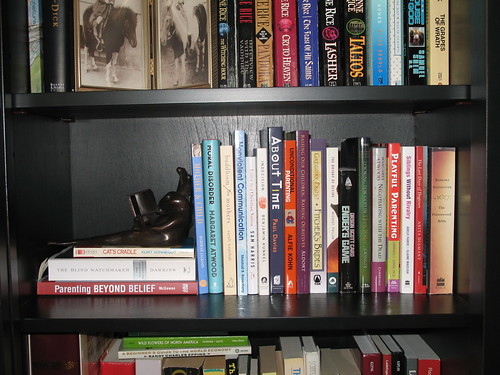 |
| Photo Credit: theloushe |
"My nightstand is a mess—the biggest eyesore in our bedroom (according to my wife). I have about 30 books piled up on top of each other. I'm constantly reading, and I'm always reading more than one book at a time. I have everything from books I've been asked to endorse to books I'm consulting for my current sermon series to books I'm reading for fun.
I'm also a curious reader, which means I'm always reading books by people just to find out how they write and what they say about certain things—which means I'm not simply reading books by people within my theological tradition. One of my concerns about some who would consider themselves "reformed" is that they only read books by other "reformed" people. This, in my opinion, is a big mistake. And when some do read books outside their own theological tradition, they only do so with an eye to critique instead of an eye to learn. At least this was my mistake for far too many years. I graduated from a well-known reformed seminary (and am unbelievably grateful for the education I received there), and I never heard of any of the books, theologians, or scholars I list below (except one). I have, therefore, greatly varied my reading over the past five years or so and am reading many more books by writers, thinkers, and scholars outside of my theological tradition. Seven years ago I heard Tim Keller say, "When you read one thinker, you become a clone. Two thinkers, you become confused. Ten thinkers, you begin developing your own voice. Two or three hundred thinkers, you become wise."The easy thing for avid readers is to simply read those that we know we already agree with or enjoy. Although this can help cement the beliefs we hold, we rarely will be challenged in our thinking. This can, at times, lead to the presumption that most others think as we do. I think it's also good for us to expose ourselves to the writings of those that are unfamiliar to us or not of "our tribe." This can help us in seeing the holes in some of our thinking, shore up that which we know to be true and cause us to look at the world differently.
As a Christian, I seek to make the Bible the guide for all other reading that I do. I try to read the Bible more than anything else and attempt to use God's Word as the lens through which I read other writings. Although I don't end up agreeing with the assertions of every author I read, there is much to be learned from those outside of our denominational affiliations or our cultural background.
For example, there are some blogs that I read in order to learn about the culture in which we live even though I don't agree with the perspective that is taken most of the time. However, I'm able to gain some insight into the thinking that is common in today's society and this helps me in relating to others from backgrounds that are different than mine.
Reading a broad range of authors can help us learn what it is that we believe and what makes us unique from others. It can help enhance our view of the world as we learn from those that have had different experiences and take the opportunity to see things through the eyes of another. I think I'm a different person than I was twenty years ago, due in no small part because of the broad range of people that I have read. And, hopefully, I'll continue to change for the better over the next twenty years.
For a list of the 25 books that have greatly influenced my life, please see this previous post.
